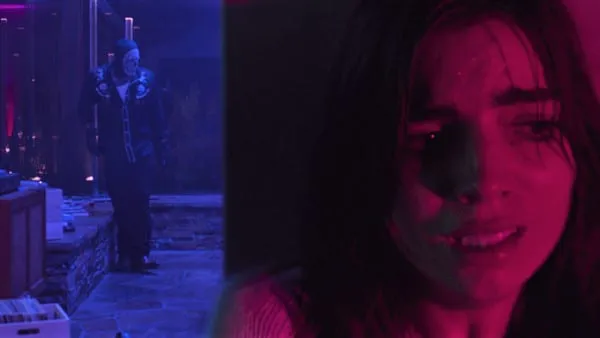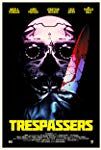Eye For Film >> Movies >> Trespassers (2018) Film Review
Trespassers
Reviewed by: Jennie Kermode

On the surface of it she's the more fragile one, but it's Joseph (Zach Avery) who finds himself pleading with Sarah (Angela Trimbur) to turn away their guests. They're recovering from a private tragedy and really need some time together away from all the pressures of the world - wasn't that the pint of renting this remote house out in the desert in the first place? Sarah, however, has been taught, like so many women, that she should be nice and out other people's feelings first. Joseph tries to put her first. this is complicated by the fact that one of the visitors is Estelle (Janel Parrish) , her best friend for many years, with whom he had a fling he hasn't told her about; and by the fact that Estelle's boyfriend Victor (Jonathan Howard) is a colossal dick whose attempts at bonding include slagging off both women and bitching about illegal immigrants (a position made more uncomfortable by the fact that Estelle is Hawaiian and has doubtless been on the receiving end of racism).
So far, it doesn't look like being the ideal weekend break, but there are other things going on as well. In a brief prologue, we've seen masked Hispanic men assaulting white people in an incident shorn of context. Then, just as night falls in the desert house, a stranger comes to the door. Played by Fairuza Balk, she seems sweet, homely, a little befuddled; she says she's a neighbour and that her car has broken down and - this being the kind of area where people can count themselves as neighbours yet still not be able to walk home - she asks to call for help. Again, Sarah responds with that instilled politeness. The woman doesn't seem dangerous. Her questions are a bit intrusive but not all that unusual. The main problem is that, with no sign of a tow-truck arriving, she just won't go away. Tensions within the group increase, exposing an established pattern of violence in the way Victor treats Estelle. Things are about to go very, very wrong.

Despite the clichés that follow, director Orson Oblowitz does a good job of keeping viewers guessing, with some of the film's most shocking incidents coming out of the blue. Each character reveals a little more complexity than we've seen on the surface, and even if they're not exactly deep they're human enough to maintain interest. Avery deserves notice for his impressive portrayal of physical pain, something most actors are really bad at (if only because what Hollywood has taught us about how people in severe pain behave is nothing like reality). His physical acting adds a good deal to the film's impact and fills out his underwritten character.
Who is trespassing here? At its simplest, the film might be read as an indictment of Victor's 'border hoppers', yet its central characters are themselves far from home in a landscape they don't understand. Joseph's intrusion into Estelle's life might be seen as a form of trespass; likewise her interruption of his relationship with Sarah. It all comes down to violence, Sarah is told at one point - there is no intellectual dimension - and yet this argument seems designed to blind her to obvious opportunities for taking control. That she's a little slow to perceive these is less irritating than in many such films because Oblowitz keeps the pace sufficiently well that viewers, too, are likely to feel a little stunned. Furthermore, Sarah has more stress to deal with than just that caused by her immediate situation, and in a way the violence around her serves as an externalisation of what she has been struggling with for rather longer.
Although much of the film takes place in low light conditions, Oblowitz does a fairly good job of ensuring we can keep track of the action, with only brief lapses. This is important because even after the pace picks up, there are twists to deliver. Also worth noting is the very effective use of music to develop both character and atmosphere.
There's some twee stuff here as well. Scenes of the women dancing are heavily male-gaze-filtered and unrealistic, and Estelle never really gets to defend herself against the patronising summaries of her character delivered by the men. The notion that some people might attack others just because they're there might shock male viewers (as indeed it seemed to do in films like The Strangers) but it's less believable that it would impress female characters, as it's a reality that women have to be aware of all the time.
Despite these problems, there's a lot to recommend Trespassers. It's beautifully crafted and does what it does very effectively. Oblowitz's background in cinematography serves him well, giving it strong visual impact and a lot more personality than its slender story might be expected to support. It might not take you where you want to go but it's a thrilling ride.
Reviewed on: 07 Jul 2019

















